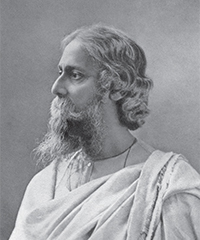Rabindranath Tagore’s Gora
In December 2011 Writing and Society postdoctoral research fellow Mridula Nath Chakraborty presented her paper ‘Indian’ skin deep: or How the Nation Came Home in Rabindranath Tagore’s Gora’. The paper was recorded and broadcast by the ABC Radio National program Big Ideas. You can listen to the program via the Big Ideas website or download the audio.

In 1912,  Rabindranath Tagore (1861-1941) “came out of nowhere” and won the first ever Nobel Prize for Literature awarded to a non-Westerner. His genius was recognised in the 100 odd poems he had translated himself from Bengali to English in a volume titled Gitanjali. Thereafter his reputation in most of the Western world was sealed as an Eastern mystic and seer, and has subsequently suffered from this misreading. In his own country, even though he shaped an entire literary canon, Tagore’s reputation was never an assured one, especially after his denunciation of nationalism in undivided India at the height of the nationalist movement for self-governance and independence from the British.
Rabindranath Tagore (1861-1941) “came out of nowhere” and won the first ever Nobel Prize for Literature awarded to a non-Westerner. His genius was recognised in the 100 odd poems he had translated himself from Bengali to English in a volume titled Gitanjali. Thereafter his reputation in most of the Western world was sealed as an Eastern mystic and seer, and has subsequently suffered from this misreading. In his own country, even though he shaped an entire literary canon, Tagore’s reputation was never an assured one, especially after his denunciation of nationalism in undivided India at the height of the nationalist movement for self-governance and independence from the British.
Written in the aftermath of the Swadeshi Movement (1905-1908, swa: own, desh: land/country), Gora (1909) was the first of Tagore’s three overtly political novels, which gave voice to his vision of political selfhood and social reform. This paper offers a contemporary reading of Gora as a site of the civilizational ethic Tagore envisioned, as well as reading it for the prescient philosophy Tagore offered within the problematic of everyday nationalisms that contribute to the ‘deepening’ of the Indian democracy. It also calls for a rethinking of nationalism in the continuing aftermath of postcolonialism in the 150th year of Tagore’s birth, which is being celebrated with much fanfare all over the world.



